
How to Write a Hypothesis: The Ultimate Guide with Examples

Hypotheses aren’t about science, experiments, and creating new theories only. While students in science classes formulate a hypothesis every second day, others from non-science fields may find it challenging to write it for an essay or a research paper.
This article is here to reveal the nature of hypothesis writing and help you learn how to write a hypothesis for essays, reports, studies, and any paper type you may need to compose.
We’ve researched all the guides, invited our top writers to answer all the FAQs students have on hypothesis writing, gathered hypothesis examples, and put first things first.
Yes, we are ready to make it loud and clear with our essay maker!
Table of Contents:
What is a Hypothesis?
A hypothesis is an assumption you make based on existing data and knowledge, stating your predictions about what your research will find. It’s a tentative answer to your research question; it needs to be testable so you could later support or refuse it through further experiments, observations, and any other scientific research methods.
Example of a hypothesis:
Teenagers who get sex education lessons in high school will have lower rates of unplanned pregnancy than those who did not get any sex education.
Your research question here is, “How effective is high school sex education at reducing teen pregnancies?” and you formulate a hypothesis to check and explain in your paper.
A hypothesis always proposes a relationship between several variables. As a rule, variables are two – independent and dependent – but it’s also possible to state more variables in your hypothesis essay, to address different aspects of your research question.
- An independent variable is the one you, as a researcher, can change or control.
- A dependent variable is the one you, as a researcher, observe and measure based on how an independent variable changes.
In the above example, we can see that an independent variable is “sex education lessons at school” (you assume it is a cause). And a dependent variable here is “lower rates of unplanned pregnancy” (you consider it’s an effect).
Please note that there’s a difference between theory and hypothesis. Also, some guides may tell you that a hypothesis equals a thesis statement in essay writing, though a slight difference between these two is yet in place.
More on that below.
Hypothesis vs. Prediction
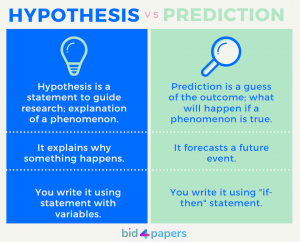
Given they both are a kind of guess, many people get a hypothesis and a prediction confused. But while a difference is slight, it’s yet critical:
- A hypothesis explains why something happens based on scientific methods (testing, experiments, data analysis, etc.).
- A prediction suggests that something will happen based on observations.
You write a hypothesis using a statement with variables, while a prediction consists of “if-then” schemes stating about future happenings.
Examples:
| Hypothesis | Prediction |
|
A blowing wind makes petals fall from trees. Fewer than eight hours of sleep causes lower productivity. Dry food consumption leads to kidney and liver problems in cats.
|
If a strong wind blows, then petals with flow from trees. If a student sleeps less than eight hours, then he’ll be less productive in classes. If a cat eats dry food only, then she’ll have kidney and liver problems.
|
We can also say that a prediction is something you expect to happen if your hypothesis statement is true.
Theory vs. Hypothesis
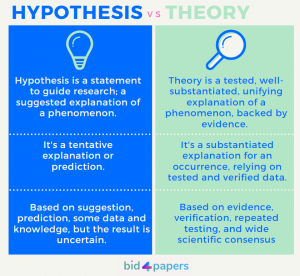
There’s also a difference between theory and hypothesis:
- A hypothesis states a suggested explanation of a phenomenon, which you’ll later support or refuse through testing and other scientific methods.
- A theory is an already tested, well-substantiated explanation backed by evidence.
You write a hypothesis using a statement with variables, while a theory represents a phenomenon that is already widely accepted and supported by data.
Examples of theories include Einstein’s theory of relativity, the Big Bang theory, Charles Darwin’s theory of evolution, and many others.
For your hypothesis to become a theory, you need to test all the aspects under various circumstances and prove it with well-substantiated facts. You can also use theories to make predictions about something unexplained and then turn those predictions into hypotheses to test and support (or refuse).
It’s worth noting that testings don’t stop once a hypothesis becomes a theory: Science is ongoing, and any theory can become disproved one day.
Hypothesis Characteristics
And now it’s high time to reveal the characteristics of your statement to become a reasonable hypothesis.
They are five:
- A cause-effect relationship between variables. When writing a hypothesis, make sure your one variable causes another one to change (or not change.) There should always be a cause-effect relationship between them.
- Testable nature. Formulate a hypothesis that you can test to support or refuse. You should be able to conduct experiments and control your thesis when working on it.
- Precise and accurate variables. Your hypothesis’s independent and dependent variables need to be specific and clear for the audience to understand.
- Explained in simple language. Research papers and academic writing, in general, are often challenging to understand for an average reader, so do your best to write a hypothesis so there would be no confusion or ambiguity.
- Ethical. We can test many things, but there’s always a question about what we should test or make a subject to experiments. Avoid questionable or taboo topics when thinking about your hypothesis outline.
Thesis Statement vs. Hypothesis in an Essay
When looking for information on writing a hypothesis essay, you can find guides telling that it’s the same with writing a thesis statement for your argumentative essay. This notion is not entirely true, and there’s still a slight difference between these two:
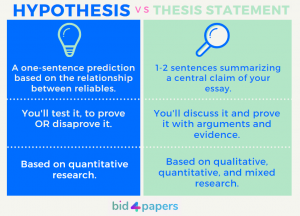
- A thesis statement is a sentence or two in your essay introduction that summarizes a central claim you’ll discuss and prove in the essay body. You’ll use arguments, evidence, and examples for that.
- A hypothesis is a one-sentence prediction based on the relationships between reliables that you’ll test and then prove or disprove in the essay body. You’ll use experiments, observation, and quantitative research for that.
Writing a research study should have a thesis statement; if your research intends to prove/disprove something, it will also contain a hypothesis statement.
Feel free to try our online thesis statement generator to get a better idea of writing strong thesis statements for your essays.
Main Hypothesis Sources
Once they ask you to write a hypothesis essay, it would be great to have some sources for inspiration at hand, wouldn’t it?
Where to go for creative ideas? Where to research hypothesis and come up with new statements for your essay? What sources do science students use?
The primary hypothesis sources are four:
- Scientific theories that already exist
- Some general patterns affecting our thinking process
- Analogies between different phenomena we observe
- The previous knowledge and observations from studies and our experience
Depending on the niche and type of hypothesis you need to cover, you’ll use corresponding sources for research and further hypothesis outline.
Below you’ll learn what types of hypotheses exist and how to write a hypothesis statement so it would sound scientific.
7 Types of Hypotheses You May Need to Write
So many sources, so many hypothesis classifications they offer. Some specify eight, ten, and even 13 types of hypotheses, depending on the factors like the number of variables you use and the experiment stage you’re in. Some insist that only two significant kinds of hypotheses exist: alternative and null; others call them directional and non-directional hypotheses, respectively.
Let’s put things straight and explain the types of hypotheses you may need to write in essays. They are seven, with examples for you to get a better idea of “who is who,” as they say.
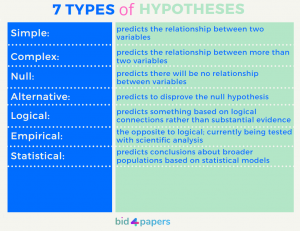
1) Simple hypothesis
It’s the most common type of hypothesis to use in college papers, predicting the direct relationship between two variables in your experiment: a single dependent and a single independent one.
How to write a simple hypothesis? Use an “if-then” format.
For example:
- Everyday smoking leads to lung cancer. (If you smoke every day, then you’ll get lung cancer.)
- Covering wounds with a bandage heals with fewer scars. (If you bandage an injury, then it will heal with less scarring.)
2) Complex hypothesis
This one also predicts the relationship between variables but has more than two dependent and independent variables to check for supporting or refusing.
For example:
- Overweight people who eat junk food have higher chances of getting excessive cholesterol and heart disease. (Two independent variables are extra weight and junk food consumption; two dependent variables are heart disease and high cholesterol level.)
- The higher illiteracy in a society, the higher is poverty and crime rate. (One independent variable is higher illiteracy, and two dependent variables are higher poverty and higher crime rate.)
3) Null hypothesis
How to write a null hypothesis? It’s the default position stating there’s no relationship between variables, i.e., there will be no difference in the experiment’s results.
Scientists use null hypotheses to disapprove or reaffirm given statements.
For example:
- A person’s productivity doesn’t suffer from getting six instead of eight hours of sleep.
- All daisies are equal in the number of their petals.
- Sex education in high school doesn’t affect unplanned pregnancy rates.
4) Alternative hypothesis
When searching for information on how to write a hypothesis online, you might see queries like “how to write a null and alternative hypothesis.” That’s because alternative hypothesis statements come in place when someone tries to disprove a null hypothesis, so these two go hand in hand.
In other words, an alternative hypothesis directly contradicts a null one.
Also, an alternative hypothesis is one you may want to develop when the experiment on your initial statement doesn’t bring any result.
For example:
- H0 (a null hypothesis): Light color does not affect plant growth.
- H1 (an alternative hypothesis): Light color affects plant growth.
Or:
- H0: Cats have no preference for food based on shape.
- H1: Cats prefer round kibbles to other food shapes.
5) Logical hypothesis
This one is a hypothesis you can verify logically, though there’s little to no substantial evidence for it. Here you use reasoning and logical connections instead of proven facts, statistics, or background research.
Logical hypotheses remain assumptions until you put them to the test and support/refuse them after experiments.
For example:
- Dogs won’t survive without water. (Here, you make an assumption based on the fact humans can’t live without water, so dogs, as mammals, won’t do that, either.)
- Creatures from Mars won’t breathe in the Earth’s atmosphere. (Here, you assume that they won’t because we humans can’t breathe on Mars.)
6) Empirical hypothesis
In plain English, it’s a currently-tested hypothesis that can yet be changed or adjusted according to the results of experiments. It’s a working hypothesis that’s yet to confirm or refuse:
Empirical hypotheses are those going through tests, trials, or errors via observation and experiments right now and can be changed later around the independent variables. As a rule, it’s the opposite of a logical hypothesis.
For example:
- Women taking vitamin E grow hair faster than those taking vitamin K.
- Mushrooms grow faster at 22 degrees Celsius than 27 degrees Celsius.
7) Statistical hypothesis
This one is a hypothesis you can test and verify statistically based on data and quantitative research methods.
How to write a statistical hypothesis?
Statistical hypotheses have quantifiable variables and are usually about the nature of a population. It comes in handy when it’s impossible to test or survey every single person in a group. To write such a hypothesis, you’ll need to state the data about your topic using a portion of people.
For example:
- 35% of the poor in the USA are illiterate.
- 60% of people talking on the phone while driving have been in at least one car accident.
- 56% of marriages end in divorce.
How to Write a Hypothesis: 5 Steps
First and foremost, it’s worth mentioning that hypothesis writing is the third step of the scientific method scholars, researchers, and science students use to test theories, answer questions, and solve problems.
The steps are six, and they are as follows:
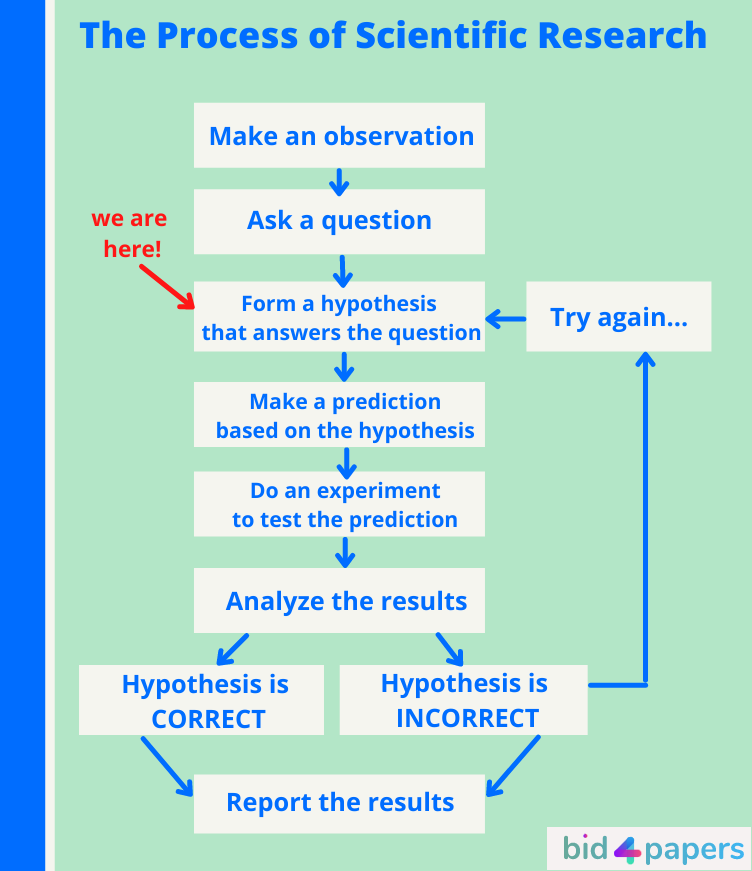
- Observation: Decide on an issue to solve or a phenomenon to explain.
- Question: Develop a research question you’d like to check.
- Hypothesis (we are here!): Formulate a hypothesis that answers your question and that you can test.
- Prediction: Determine the experiment’s outcome based on your hypothesis.
- Test: Do your experiments to test your prediction.
- Analyze: Review the results to see if your hypothesis was correct. If it wasn’t, you could revise it by formulating another one and going through the whole process again.
In academic writing, hypotheses come as something relating to thesis statements: It’s a sentence or two summarizing a central claim you’ll discuss and prove in your essay.
It stands to reason that hypothesis writing is more common for STEM disciplines like math, chemistry, biology, physics, or economics. Here’s how to craft it, step by step:
1) Ask a Question
This stage is about choosing an argumentative topic for your essay. Except as assigned by a teacher or a thesis tutor, you can start with an issue of your interest, so your curiosity and questions on it come naturally.
Why is it the way it is?
Why does it happen the way it goes?
What causes this factor you see around?
Your question needs to be clear, specific, and manageable so you can research it, test it, and analyze the results. Also, ensure it’s not too broad so you can focus on its particular aspect to formulate your hypothesis.
For example: How does eating apples affect human dental health?
2) Conduct Research
Now you’ll need to check and collect some information on your question to understand if it’s possible to formulate a research hypothesis. It’s so-called initial research to find an answer to your question.
This stage is not about proving or disproving your hypothesis. Here you’ll collect facts, theories, past studies, and any other information that will help prove or disprove it so that you can make an apparent assumption: Based on the gathered information, you’ll be able to make a logical guess.
Depending on your question, this initial research can take some time from you. You may need to read a few books on the topic, find and compare some scientific materials, etc. Or, it may be enough to perform a quick web search to find the answer.
3) Write a Null Hypothesis
To ease the process of hypothesis writing, start with a null hypothesis. As you already know, it’s the default position stating no relationship between variables. (And that’s why it’s so easy to formulate.)
So, take your initial question and write it as a negative statement. In our example with eating apples and dental health, the null hypothesis would sound like that:
Eating apples do not affect a human’s dental health.
(Which means your teeth condition will be the same, whether you eat apples or not.)
4) Define Variables
And now, for your hypothesis to become testable so you can do experiments, make predictions, and analyze the results, think of dependent and independent variables for it.
As you already know, independent variables are the factors you, as a researcher, can control during experiments to check the hypothesis.
Example: Eating one apple a day will positively affect a human’s dental health.
“One apple” is the independent variable, and “dental health” is the dependent variable here.
You’ll come up with variables based on your initial research. With some facts and studies already in place, you can predict how your experiment may go and what its results may be. Use this knowledge to shape variables into a clear and concise hypothesis.
And remember:
The way you’ll frame a hypothesis into one sentence depends on a few factors: the type of your project and the type of hypothesis you want to use.
Simple hypotheses are most common for student research papers, so we use them as examples here. With that in mind, the final stage of hypothesis writing comes:
5) State It Using an If-Then Format
To formulate a hypothesis the best way possible, try framing it with an “if-then” format. Like this:
If a human eats one apple per day, then he gets healthier teeth.
This format becomes tricky when working with complex hypotheses with multiple variables, but it’s reliable when expressing the cause-and-effect relationship.
The “if-then” format allows you to refine a hypothesis and ensure its final version:
- is clear, specific, and testable;
- has relevant variables;
- identifies the relationship between variables;
- suggests a predicted result of the experiment.
Another way to check if you’ve shaped a hypothesis properly is using the “PICOT” model, best explained via visual examples. According to this model, a hypothesis should have five components:
P – population: the specific group or individual of your research
I – interest: the primary concern of your study
C – comparison: the leading alternative group
O – outcome: the expected result
T – time: the length of your experiment
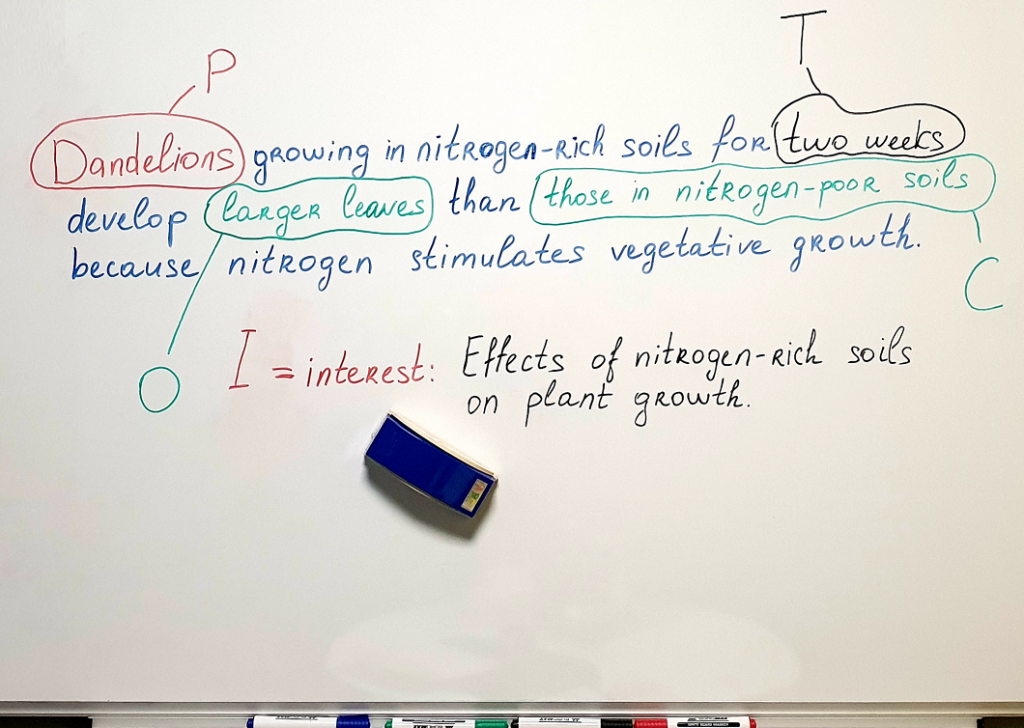
NB!
Always write a hypothesis in the present tense because it refers to research that’s currently being conducted.
What is a Hypothesis in a Research Paper?
A hypothesis in a research paper is a statement demonstrating a prediction you believe may happen based on research, evidence, and experimentation.
Often used and associated with science, hypotheses are assumptions (or guesses) for researchers and scholars to prove or disprove via tests and experiments. And they later write a hypothesis essay to analyze and report the experiments’ results to the scientific community.
When writing a hypothesis for a research paper, you should still describe an experiment to prove or disprove it. However, hypothesis essays don’t necessarily have to be on STEM disciplines and tests taken in a lab:
- You can write a book critique and state a hypothesis on its or its author’s impact on literature.
- Or, your hypothesis essay can be about how demographics change a country’s language.
- Or, you’ll write an autobiography with a focus on the hypothesis that one particular event influenced your further deeds.
In such essays, you won’t spend hours in labs to prove that your hypothesis is true; you’ll do that through research, arguments, data, interviews, or previous studies.
Is a thesis statement a hypothesis?
As we already mentioned, there’s a slight difference between these two. While thesis statements in essays are about summarizing a central claim you’ll discuss, hypotheses are about predictions or assumptions you’ll prove (or disprove) in the essay body.
And remember:
You don’t have to prove that your hypothesis is correct. The point is to research, test, and experiment to see if you’re right. Even if your hypothesis appears incorrect in conclusion, it doesn’t mean the quality of your essay is poor.
How to Write a Hypothesis: Example
And now, let’s go to even more hypothesis examples for you to understand the nature of this writing better.
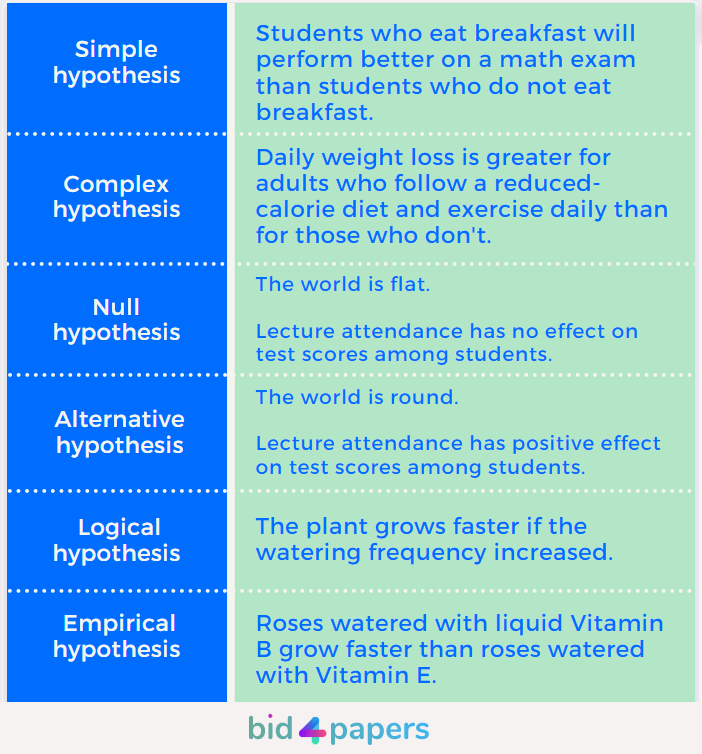
Here goes another example of a hypothesis:
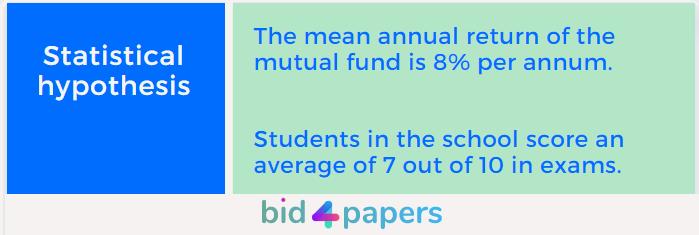
Frequently Asked Questions
-
What is a hypothesis in an essay?
A hypothesis in an essay is a statement demonstrating a prediction you believe may happen based on research, evidence, and experimentation. As a rule, it predicts the relationship between a few variables; and you can prove or disprove it by the end of your tests and experiments on it.
-
How long is a hypothesis?
A hypothesis is one-sentence long. It should be clear, direct, and testable through experimentation, predicting a possible outcome.
-
How to write a hypothesis statement?
First of all, you need to state a problem you’re trying to solve, do some initial research on it to learn the background and predict an outcome, and then think of both dependent and independent variables for your hypothesis. For that, research or brainstorm ideas for your stated problem’s solution. Finally, write your hypothesis as an “if-then” statement, using your variables.
-
How to write a null hypothesis?
A null hypothesis is the default position stating no relationship between variables. To write it, you need to assume an experiment has no effect regardless of variables; use denying.
For example, you want to learn whether teens are better at math than adults. In this case, your null hypothesis will be, “Age does not affect math ability.”
-
How to write an alternative hypothesis?
An alternative hypothesis directly contradicts a null one, trying to disprove it. To write it, you need to assume there’s enough evidence to reject the null hypothesis; but never state your claim is already proven true or false.
In contrast with a null hypothesis, typically marked as H0, an alternative one gets an H1 mark. For example:
H0: If I put Mentos into a Coke bottle, there will be no reaction.
H1: If I put Mentos into a Coke bottle, there will be a big explosion.
-
How to write a simple hypothesis?
A simple hypothesis is the most common one to use in college papers. It predicts the direct relationship between two variables — one dependent and one independent, — so write a simple hypothesis with an “if-then” format.
For example:
If a postpartum woman has low hemoglobin, then she gets higher risk of infection.
-
How to write a statistical hypothesis?
A statistical hypothesis claims the value of a single population characteristic or relationship between several population characteristics. To write it, you first need to specify null and alternative hypotheses, set the significance level, calculate the statistics, and draw a conclusion. Ensure that your variables are quantifiable. For example:
A population mean is equal to 10.
-
How to write a hypothesis for a lab report?
To write a hypothesis for a lab report, you should state the issue, predict its outcome based on tests and experiments, define the variables, and formulate a hypothesis as an if-then statement. For example:
If one puts Mentos in a bottle with Coke, there will be an explosion.
-
How to write a hypothesis for a research paper?
- Decide on a question/problem you want to check/solve.
- Conduct initial research to collect as much background information and observation about your topic as you can.
- Evaluate this information to assume possible causes and possible explanations.
- Define variables you’ll use to confirm or disprove your hypothesis through experimentation.
- Write down a one-sentence hypothesis using the present tense.
Summary
Now that you know how to write a hypothesis, it’s high time to give it a try:
- Address your curiosity.
- Ask questions.
- Conduct some initial research.
- Come up with a type of hypothesis that fits your expectations most.
Think of variables for your hypothesis, and ensure it’s clear, concise, and measurable (testable). Then write it in the present tense — and you’ve got it!
Any questions left? Don’t hesitate to write in the comments (yes, we read them and reply!) or ask Bid4Papers writers directly!